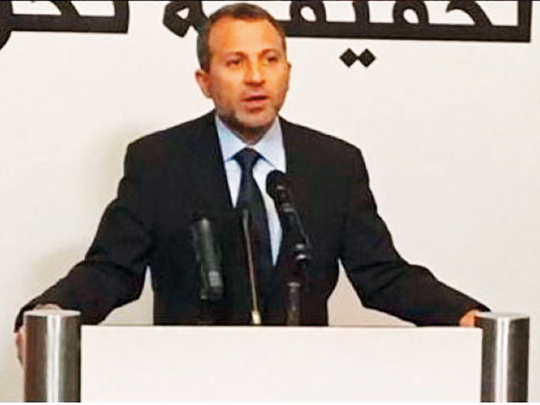
Beirut: Provocative comments by Lebanon’s maverick foreign minister Jibran Bassil are sure to incite widespread anger after he said he wanted his Christian Free Patriotic Movement (FPM) to become the third Shiite party, after Hezbollah and Amal.
Bassil was addressing the Shiite-majority town of Shaath in the Bekaa Valley on Sunday where his comments were well-received by residents.
However, observers say the comments would have serious repercussions in a country that struggles to maintain a delicate sectarian balance which keeps it from falling back into civil war as it did for 15 years back in the 70s and 80s.
His comments also come within the context of ongoing debates over a new electoral law.
Politicians have been debating revising the archaic 1960 voting law since 2005 and have yet to reach consensus.
According to the 1960 voting law, parliament seats are allocated by religious sects which Lebanon’s most prominent Christian parties want to amend.
They say the law marginalises Christian voters, because, in the winner-take-all model Muslim voters in predominantly Christian districts cast their ballots to candidates backed by lists dominated by non-Christian parties.
In April, President Michel Aoun, Bassil’s father-in-law, made the unprecedented move to suspend parliament which was due to extend its term for third time since 2009.
The move was hailed by Christians but slammed by Shiite politicians including Nabih Berri, who also is the Amal party chief.
Powerful Shiite groups like the Iran-backed Hezbollah and Amal want proportional representation or the winner-takes-all system since that would give it potential control of parliament due to its large numbers.
In his comments Sunday, Bassil insisted on proportional representation which would “put an end to the monopolisation” of certain sects.
While Parliament Speaker and Amal chief, Nabih Berri, accused Bassil in the past of fomenting sectarianism, the foreign minister denied the accusation.
“Would a sectarian party inaugurate four FPM offices in one day in northern Bekaa?”, he asked his mainly-Shiite audience.
The comments come amid a growing trend of open hatred of Sunnis in the country, which was first expressed by the FPM under Aoun right after the Taif accords, which ended Lebanon’s civil war in 1990.
Since that time, the FPM viewed Sunnis as a demographic threat, due to their large numbers combined in the Levant — Palestine, Syria, Jordan, Lebanon.
It was that distrust that pushed FPM into a mutual interest alliance with Hezbollah.
While focusing his attention on Sunni extremism and not realising how his own comments could breed instability and sectarianism, critics accuse Bassil of hypocrisy.
Inasmuch as there also is a visceral dislike of Saudi Arabia and all Gulf Cooperation Council States within the FPM — notwithstanding periodic public relations efforts to encourage GCC tourists to come and spend money in Lebanon — Bassil insisted that his party stood by “our Shiite brothers in Lebanon when we sense that they are being targeted, because … they [meaning Arab Gulf Sunnis] want to crush the resistance (Hezbollah)”
Reaction to Bassil’s declaration on social media was ugly as S.O.S. wrote “We had suspicions that Aoun secretly converted to Shiism, making him the first Shiite president of the republic!”.
Justin pointed to Bassil’s contradictory statements, defending Future because that would preserve moderation in Lebanon.












